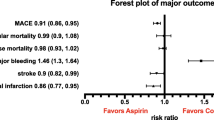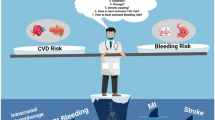Abstract
Aspirin remains one of the most extensively studied cardiovascular medications in the history of medicine. However, despite multiple, well-designed, large randomized controlled trials evaluating the potential of aspirin to prevent cardiovascular events in individuals without known cardiovascular disease (CVD), the role of aspirin in primary prevention is currently unclear. The initial aspirin trials included largely low-risk individuals with primary outcomes mostly focused on myocardial infarction (MI) and stroke, and showed a significant reduction in these CVD outcomes, especially MI. The more recently conducted trials have focused on older, higher CVD risk populations with high rates of lipid-lowering and antihypertensive medications use. These studies have used broader CVD outcomes as their primary end points and have failed to show a significant benefit of aspirin therapy in primary prevention. The exact reasons for the lack of efficacy in these recent trials are unclear but may be related to low rate of atherothrombotic events relative to other CVD events in the populations studied. Four large randomized controlled trials are currently underway which should provide some clarity in determining the optimal use of aspirin in the primary prevention of CVD.

Similar content being viewed by others
References
Papers of particular interest, published recently, have been highlighted as: • Of importance •• Of major importance
Barnett HJ. Platelet and coagulation function in relation to thromboembolic stroke. Adv Neurol. 1977;16:45–70.
OLIVA PB. Pathophysiology of acute myocardial infarction, 1981. Ann Intern Med. 1981;94(2):236–50.
Moore S. Platelet aggregation secondary to coronary obstruction. Circulation. 1976;53(3 Suppl):I66–9.
Schrör K. Aspirin and platelets: the antiplatelet action of aspirin and its role in thrombosis treatment and prophylaxis. Semin Thromb Hemost. 1997;23(4):349–56.
Elwood PC, Cochrane AL, Burr ML, Sweetnam PM, Williams G, Welsby E, et al. A randomized controlled trial of acetyl salicylic acid in the secondary prevention of mortality from myocardial infarction. Br Med J. 1974;1(5905):436–40.
Elwood PC, Sweetnam PM. Aspirin and secondary mortality after myocardial infarction. Lancet. 1979;314(8156):1313–5.
Antithrombotic Trialists’ Collaboration. Collaborative meta-analysis of randomised trials of antiplatelet therapy for prevention of death, myocardial infarction, and stroke in high risk patients. BMJ. 2002;324(7329):71–86.
Berger JS, Brown DL, Becker RC. Low-dose aspirin in patients with stable cardiovascular disease: a meta-analysis. Am J Med. 2008;121(1):43–9.
CAST: Randomised placebo-controlled trial of early aspirin use in 20,000 patients with acute ischaemic stroke. CAST (chinese acute stroke trial) collaborative group. Lancet 1997; 349(9066):1641-9.
Hennekens CH. Final report on the aspirin component of the ongoing physicians health study. New England J Med. 1989;321(3):129–35. A landmark trial that established aspirin as a potential treatment for the primary prevention of CHD. A 44% reduction in the risk of non-fatal and fatal MI was seen.
Peto R, Gray R, Collins R, Wheatley K, Hennekens C, Jamrozik K, et al. Randomised trial of prophylactic daily aspirin in british male doctors. Br Med J (Clin Res Ed). 1988;296(6618):313–6.
Thrombosis prevention trial: randomised trial of low-intensity oral anticoagulation with warfarin and low-dose aspirin in the primary prevention of ischaemic heart disease in men at increased risk. The medical research council’s general practice research framework. Lancet 1998; 351(9098):233-41.
Hansson L, Zanchetti A, Carruthers SG, Dahlöf B, Elmfeldt D, Julius S, et al. Effects of intensive blood-pressure lowering and low-dose aspirin in patients with hypertension: principal results of the hypertension optimal treatment (HOT) randomised trial. HOT study group. Lancet. 1998;351(9118):1755–62.
de Gaetano G. Collaborative Group of the Primary Prevention Project. Low-dose aspirin and vitamin E in people at cardiovascular risk: a randomised trial in general practice. Collaborative group of the primary prevention project. Lancet. 2001;357(9250):89–95.
Ridker PM, Cook NR, Lee I-M, Gordon D, Gaziano JM, Manson JE, et al. A randomized trial of low-dose aspirin in the primary prevention of cardiovascular disease in women. New England J Med. 2005;352(13):1293–304. The Women’s Health Study is the only aspirin trial to include only women. The primary outcome of the trial was negative but the event rate was quite low. A significant reduction in stroke was found as well as a reduction in MI for women age 65 or older.
Belch J, MacCuish A, Campbell I, Cobbe S, Taylor R, Prescott R, et al. The prevention of progression of arterial disease and diabetes (POPADAD) trial: factorial randomised placebo controlled trial of aspirin and antioxidants in patients with diabetes and asymptomatic peripheral arterial disease. BMJ. 2008;337:a1840.
Ogawa H, Nakayama M, Morimoto T, Uemura S, Kanauchi M, Doi N, et al. Low-dose aspirin for primary prevention of atherosclerotic events in patients with type 2 diabetes: a randomized controlled trial. JAMA. 2008;300(18):2134–41.
Fowkes FG, Price JF, Stewart MC, Butcher I, Leng GC, Pell AC, et al. Aspirin for Asymptomatic Atherosclerosis Trialists. Aspirin for prevention of cardiovascular events in a general population screened for a low ankle brachial index: a randomized controlled trial. JAMA. 2010;303(9):841–8.
Ikeda Y, Shimada K, Teramoto T, Uchiyama S, Yamazaki T, Oikawa S, et al. Low-dose aspirin for primary prevention of cardiovascular events in Japanese patients 60 years or older with atherosclerotic risk factors: a randomized clinical trial. JAMA. 2014;312(23):2510–20. The JPPP study is the most recent trial evaluating aspirin for primary prevention of CVD. The study found that aspirin did not reduce total CVD in a group of older Japanese patient with at least one major CVD risk factor.
U.S. Preventive Services Task Force. Aspirin to prevent cardiovascular disease (CVD) and cancer: consumer guide (draft recommendation). http://www.uspreventiveservicestaskforce.org/Home/GetFileByID/2292. Accessed on September 28, 2015.
Berger JS, Roncaglioni MC, Avanzini F, Pangrazzi I, Tognoni G, Brown DL. Aspirin for the primary prevention of cardiovascular events in women and men: a sex-specific meta-analysis of randomized controlled trials. JAMA. 2006;295(3):306–13.
US Preventive Services Task Force. Aspirin for the prevention of cardiovascular disease: U.S. preventive services task force recommendation statement. Ann Intern Med. 2009;150(6):396–404.
AHA Guidelines for Primary Prevention of Cardiovascular Disease and Stroke: 2002 Update: Consensus panel guide to comprehensive risk reduction for adult patients without coronary or other atherosclerotic vascular diseases. Circulation 2002;106:388-91.
Effectiveness-based guidelines for the prevention of CVD in women—2011 update. A guideline from the American Heart Association. Circulation 2011;123:1243-62.
Seshasai SR, Wijesuriya S, Sivakumaran R, Nethercott S, Erqou S, Sattar N, et al. Effect of aspirin on vascular and nonvascular outcomes: meta-analysis of randomized controlled trials. Arch Intern Med. 2012;172(3):209–16.
Perk J, De Backer G, Gohlke H, European Association for Cardiovascular Prevention & Rehabilitation (EACPR); ESC Committee for Practice Guidelines (CPG), et al. European Guidelines on cardiovascular disease prevention in clinical practice (version 2012). The Fifth Joint Task Force of the European Society of Cardiology and Other Societies on Cardiovascular Disease Prevention in Clinical Practice (constituted by representatives of nine societies and by invited experts). Eur Heart J. 2012;33(13):1635–701.
Eckel RH, Jakicic JM, Ard JD, Miller NH, Hubbard VS, Nonas CA, et al. 2013 AHA/ACC guideline on lifestyle management to reduce cardiovascular risk. J Am Coll Cardiol. 2014;63:2960–84.
Stone NJ, Robinson JG, Lichtenstein AH, et al. 2013 ACC/AHA guideline on the treatment of blood cholesterol to reduce atherosclerotic cardiovascular risk in adults: a report of the American College of Cardiology/American Heart Association Task Force on Practice Guidelines. J Am Coll Cardiol. 2014;63:2889–934.
Cutler JA, Sorlie PD, Wolz M, et al. Trends in hypertension prevalence, awareness, treatment, and control rates in United States adults between 1988-1994 and 1999-2004. Hypertension. 2008;52:818–27.
Mann D, Reynolds K, Smith D, et al. Trends in statin use and low density lipoprotein cholesterol levels among US adults: impact of the 2001 National Cholesterol Education Program guidelines. Ann Pharmacother. 2008;42:1208–15.
Brugts JJ, Yetgin T, Hoeks SE, Gotto AM, Shepherd J, Westendorp RG, et al. The benefits of statins in people without established cardiovascular disease but with cardiovascular risk factors: meta-analysis of randomised controlled trials. BMJ. 2009;338:b2376.
Turnbull F. Blood Pressure Lowering Treatment Trialists’ Collaboration. Effects of different blood-pressure-lowering regimens on major cardiovascular events: results of prospectively-designed overviews of randomised trials. Lancet. 2003;362(9395):1527–35.
Yeh RW, Sidney S, Chandra M, et al. Population trends in incidence and outcomes of acute myocardial infarction. N Engl J Med. 2010;362:2155–65.
Ford ES, Ajani UA, Croft JB, Critchley JA, Labarthe DR, Kottke TE, et al. Explaining the decrease in U.S. deaths from coronary disease, 1980-2000. N Engl J Med. 2007;356(23):2388–98.
George J, Rapsomaniki E, Pujades-Rodriguez M, Shah AD, Denaxas S, Herrett E, et al. How does cardiovascular disease first present in women and men? Incidence of 12 cardiovascular diseases in a contemporary cohort of 1,937,360 people. Circulation. 2015;CIRCULATIONAHA-114.
Bayer ARRIVE aspirin research study; Available from: http://www.arrive-study.com/EN/study.cfm. Accessed 18 August 2015.
ASPREE Investigator Group. Study design of aspirin in reducing events in the elderly (ASPREE): a randomized, controlled trial. Contemp Clin Trials. 2013;36(2):555–64.
ASCEND trial website; Available from: https://www.ctsu.ox.ac.uk/ascend/. Accessed 18 August 2015.
De Berardis G, Sacco M, Evangelista V, Filippi A, Giorda CB, Tognoni G, et al. Aspirin and simvastatin combination for cardiovascular events prevention trial in diabetes (ACCEPT-D): design of a randomized study of the efficacy of low-dose aspirin in the prevention of cardiovascular events in subjects with diabetes mellitus treated with statins. Trials. 2007;8:21.
Miedema MD, Duprez DA, Misialek JR, Blaha MJ, Nasir K, Silverman MG, et al. Use of coronary artery calcium testing to guide aspirin utilization for primary prevention: estimates from the multi-ethnic study of atherosclerosis. Circ Cardiovasc Qual Outcomes. 2014;7(3):453–60. This study provided estimates demonstrating that coronary artery calcium may provide patients with personalized risk information to help determine their risk/benefit profile from aspirin therapy.
Author information
Authors and Affiliations
Corresponding author
Ethics declarations
Conflict of Interest
Michael D. Miedema, Joseph Huguelet, and Salim S. Virani declare that they have no conflict of interest.
Human and Animal Rights and Informed Consent
This article does not contain any studies with human or animal subjects performed by any of the authors.
Additional information
This article is part of the Topical Collection on Coronary Heart Disease
Rights and permissions
About this article
Cite this article
Miedema, M.D., Huguelet, J. & Virani, S.S. Aspirin for the Primary Prevention of Cardiovascular Disease: In Need of Clarity. Curr Atheroscler Rep 18, 4 (2016). https://doi.org/10.1007/s11883-015-0555-0
Published:
DOI: https://doi.org/10.1007/s11883-015-0555-0




